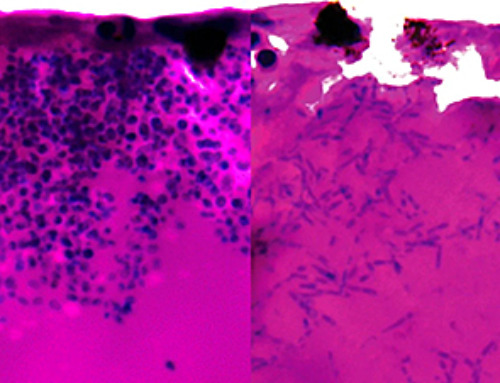The study shows that frequent use of high-potency cannabis alters DNA, affecting genes related to energy and immune function. These changes differ between those with and without psychosis, suggesting cannabis use could influence mental health through biological pathways.
According to new research from the Institute of Psychiatry, Psychology & Neuroscience at King's College London and the University of Exeter, the use of high-potency cannabis leaves a unique imprint on DNA.
Published in Molecular Psychiatry, this is the first study to suggest that the use of high-potency cannabis leaves a distinct mark on DNA, providing valuable insights into the biological impact of cannabis use. High-potency cannabis is defined as having Delta-9-tetrahydrocannabinol (THC) content of 10 percent or more.
The research also showed the effect of cannabis use on DNA is different in people experiencing their first episode of psychosis compared to users who have never experienced psychosis, suggesting there could be potential for DNA blood tests to help characterize those cannabis users at risk of developing psychosis to inform preventative approaches.
The study was funded by the Medical Research Council, the National Institute for Health and Care Research (NIHR) Maudsley Biomedical Research Centre (BRC), and the NIHR Exeter BRC.
Senior author Marta Di Forti, Professor of Drugs, Genes, and Psychosis at King's IoPPN said: "With the increasing prevalence of cannabis use and more availability of high potency cannabis, there is a pressing need to better understand its biological impact, particularly on mental health. Our study is the first to show that potency cannabis leaves a unique signature on DNA related to mechanisms around the immune system and energy production. Future research needs to explore if the DNA signature for current cannabis use, and in particular the one of high potency types, can help identify those users most at risk to develop psychosis, both in recreational and medicinal use settings."
Research Focus on DNA Methylation
Researchers explored the effects of cannabis use on DNA methylation – a chemical process detected in blood samples that alters how genes are functioning (whether they are switched 'on' or 'off'). DNA methylation is a type of epigenetic change, which means it alters gene expression without affecting the DNA sequence itself and is considered a vital factor in the interplay between risk factors and mental health.
The laboratory team at the University of Exeter conducted complex analyses of DNA methylation across the whole human genome using blood samples from both people who have experienced first-episode psychosis and those who have never had a psychotic experience. The researchers investigated the impact of current cannabis use, including frequency and potency, on the DNA of a total of 682 participants
Key Findings on Gene Function
The analysis showed that frequent users of high-potency cannabis had changes in genes related to mitochondrial and immune function, particularly the CAVIN1 gene, which could affect energy and immune response. These changes were not explained by the well-established impact that tobacco has on DNA methylation, which is usually mixed into joints by most cannabis users.
Dr. Emma Dempster, Senior Lecturer at the University of Exeter and the study's first author, said: "This is the first study to show that frequent use of high-potency cannabis leaves a distinct molecular mark on DNA, particularly affecting genes related to energy and immune function. Our findings provide important insights into how cannabis use may alter biological processes. DNA methylation, which bridges the gap between genetics and environmental factors, is a key mechanism that allows external influences, such as substance use, to impact gene activity. These epigenetic changes, shaped by lifestyle and exposures, offer a valuable perspective on how cannabis use may influence mental health through biological pathways."
Dr. Emma Dempster meta-analyzed data from two cohorts: the GAP study, which consists of patients with first-episode psychosis in South London and Maudsley NHS Foundation Trust, and the EU-GEI study, which consists of patients with first-episode psychosis and healthy controls across England, France, the Netherlands, Italy, Spain, and Brazil. This totaled 239 participants with first-episode psychosis and 443 healthy controls representing the general population from both studies sites who had available DNA samples.
Most of the cannabis users in the study used high-potency cannabis more than once a week (defined as frequent use) and had first used cannabis at age 16 years old, on average. High potency cannabis was defined as having Delta-9-tetrahydrocannabinol (THC) content of 10 percent or greater. THC is the principal psychoactive constituent in cannabis.
Reference: "Methylomic signature of current cannabis use in two first-episode psychosis cohorts" by Emma L. Dempster, Chloe C. Y. Wong, Joe Burrage, Eilis Hannon, Diego Quattrone, Giulia Trotta, Victoria Rodriguez, Luis Alameda, Edoardo Spinazzola, Giada Tripoli, Isabelle Austin-Zimmerman, Zhikun Li, Charlotte Gayer-Anderson, Tom P. Freeman, Emma C. Johnson, Hannah E. Jongsma, Simona Stilo, Caterina La Cascia, Laura Ferraro, Daniele La Barbera, Antonio Lasalvia, Sarah Tosato, Ilaria Tarricone, Giuseppe D'Andrea, Michela Galatolo, Andrea Tortelli, Maurizio Pompili, Jean-Paul Selten, Lieuwe de Haan, Paulo Rossi Menezes, Cristina M. Del Ben, Jose Luis Santos, Manuel Arrojo, Julio Bobes, Julio Sanjuán, Miguel Bernardo, Celso Arango, Peter B. Jones, Gerome Breen, Valeria Mondelli, Paola Dazzan, Conrad Iyegbe, Evangelos Vassos, Craig Morgan, Diptendu Mukherjee, Jim van Os, Bart Rutten, Michael C. O'Donovan, Pak Sham, Jonathan Mill, Robin Murray and Marta Di Forti, 16 October 2024, Molecular Psychiatry.
DOI: 10.1038/s41380-024-02689-0
Funding: Medical Research Council, NIHR Maudsley Biomedical Research Centre
News
Scientists Unlock a New Way to Hear the Brain’s Hidden Language
Scientists can finally hear the brain’s quietest messages—unlocking the hidden code behind how neurons think, decide, and remember. Scientists have created a new protein that can capture the incoming chemical signals received by brain [...]
Does being infected or vaccinated first influence COVID-19 immunity?
A new study analyzing the immune response to COVID-19 in a Catalan cohort of health workers sheds light on an important question: does it matter whether a person was first infected or first vaccinated? [...]
We May Never Know if AI Is Conscious, Says Cambridge Philosopher
As claims about conscious AI grow louder, a Cambridge philosopher argues that we lack the evidence to know whether machines can truly be conscious, let alone morally significant. A philosopher at the University of [...]
AI Helped Scientists Stop a Virus With One Tiny Change
Using AI, researchers identified one tiny molecular interaction that viruses need to infect cells. Disrupting it stopped the virus before infection could begin. Washington State University scientists have uncovered a method to interfere with a key [...]
Deadly Hospital Fungus May Finally Have a Weakness
A deadly, drug-resistant hospital fungus may finally have a weakness—and scientists think they’ve found it. Researchers have identified a genetic process that could open the door to new treatments for a dangerous fungal infection [...]
Fever-Proof Bird Flu Variant Could Fuel the Next Pandemic
Bird flu viruses present a significant risk to humans because they can continue replicating at temperatures higher than a typical fever. Fever is one of the body’s main tools for slowing or stopping viral [...]
What could the future of nanoscience look like?
Society has a lot to thank for nanoscience. From improved health monitoring to reducing the size of electronics, scientists’ ability to delve deeper and better understand chemistry at the nanoscale has opened up numerous [...]
Scientists Melt Cancer’s Hidden “Power Hubs” and Stop Tumor Growth
Researchers discovered that in a rare kidney cancer, RNA builds droplet-like hubs that act as growth control centers inside tumor cells. By engineering a molecular switch to dissolve these hubs, they were able to halt cancer [...]
Platelet-inspired nanoparticles could improve treatment of inflammatory diseases
Scientists have developed platelet-inspired nanoparticles that deliver anti-inflammatory drugs directly to brain-computer interface implants, doubling their effectiveness. Scientists have found a way to improve the performance of brain-computer interface (BCI) electrodes by delivering anti-inflammatory drugs directly [...]
After 150 years, a new chapter in cancer therapy is finally beginning
For decades, researchers have been looking for ways to destroy cancer cells in a targeted manner without further weakening the body. But for many patients whose immune system is severely impaired by chemotherapy or radiation, [...]
Older chemical libraries show promise for fighting resistant strains of COVID-19 virus
SARS‑CoV‑2, the virus that causes COVID-19, continues to mutate, with some newer strains becoming less responsive to current antiviral treatments like Paxlovid. Now, University of California San Diego scientists and an international team of [...]
Lower doses of immunotherapy for skin cancer give better results, study suggests
According to a new study, lower doses of approved immunotherapy for malignant melanoma can give better results against tumors, while reducing side effects. This is reported by researchers at Karolinska Institutet in the Journal of the National [...]
Researchers highlight five pathways through which microplastics can harm the brain
Microplastics could be fueling neurodegenerative diseases like Alzheimer's and Parkinson's, with a new study highlighting five ways microplastics can trigger inflammation and damage in the brain. More than 57 million people live with dementia, [...]
Tiny Metal Nanodots Obliterate Cancer Cells While Largely Sparing Healthy Tissue
Scientists have developed tiny metal-oxide particles that push cancer cells past their stress limits while sparing healthy tissue. An international team led by RMIT University has developed tiny particles called nanodots, crafted from a metallic compound, [...]
Gold Nanoclusters Could Supercharge Quantum Computers
Researchers found that gold “super atoms” can behave like the atoms in top-tier quantum systems—only far easier to scale. These tiny clusters can be customized at the molecular level, offering a powerful, tunable foundation [...]
A single shot of HPV vaccine may be enough to fight cervical cancer, study finds
WASHINGTON -- A single HPV vaccination appears just as effective as two doses at preventing the viral infection that causes cervical cancer, researchers reported Wednesday. HPV, or human papillomavirus, is very common and spread [...]





















